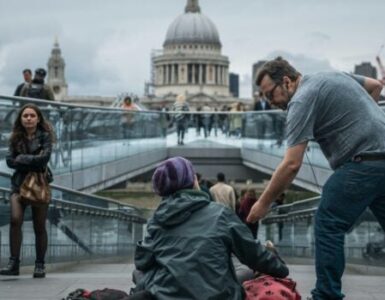I threw out an ice breaker soon after my team and I met the sophomore class with whom we would spend the day leading on retreat.
A few hands went up, and I pointed to a girl, “Yes, young lady,” to which she replied, “Call me ‘they.’”
While this wasn’t my first rodeo, I had to smile inside as I prayed to the Holy Spirit, “That was quick; I hope you are ready!”
Conscious of the fact that the young people we meet are victims of a very toxic culture that has abused them in so many ways, I tread carefully. “Why do you want me to call you ‘they?’”
She answered, “I am gender neutral, non-binary.”
She was looking directly at me, and as our eyes connected my heart went out to her. I think she sensed it. I said, “I wonder if you will do me a favor…I’m a simple guy, I don’t even know your names and now I have to learn your pronouns. I don’t think I’m capable of remembering it all. So just for now—and we can go to plan B later if you don’t like it—may I call you a Beloved Child of God?”
I’m sure the Holy Spirit was present because she slowly nodded her head yes. “Me too,” I exclaimed, “I’m a Beloved Child of God, as is each person in this room. We share a common heritage.”
I thanked her, and looking up at the class asked, “Who is ready to go on an adventure, a journey to the heart? To a place of peace where no one is allowed to impose their opinions or ideology on you, but where you will use your own God-given reason to seek the truth and use your free will to choose the good? Let me begin by sharing a story.”
I began with an anecdote about a childhood scuba diving trip to the beautiful Turks and Caicos. It was a very windy day, and the captain was having a hard time finding a place to anchor in the turbulent waters. He finally tucked us behind an island but cautioned us to be extra careful jumping off the boat.
Helped to the edge by a crew member, I timed my jump so as not to hit the side of the rocking boat. After sinking beneath the surface of the water, two things happened. First, it became calm and quiet; then, a new world of awe and wonder opened before my eyes.
In this talk, I shared with them that prayer of the heart was like that. It frees us from the turbulent waters of noise and distraction. I invited my audience to submerge themselves into the heart—a place of awe, wonder, and peace, away from the world’s ideologies, labels, and manipulations.
“The heart,” I continued, “is a place of discovery, where you find God, know that you are loved by Him, and discover your identity for yourselves. From this place of self-knowledge, you can look out and make better sense of the fallen world that entices you to live only on the surface, with no protection from the waves that seek to stifle your freedom.”
We led those young people to that place of prayer and silence. Though the retreat’s adult leaders had predicted hesitation, these young people immersed themselves into it.
After a few moments, I asked them if they wanted the class to pray with them for something or someone that was on their hearts. One by one, they offered up prayer intentions. As we shared in one another’s pain, fears, and anxieties, an amazing grace came over the whole group, and we knew that the love of the Father was being poured over us.
My heart aches for young people growing up in a twisted, distorted, and toxic culture. They have been repeatedly lied to about the very basics concerning the meaning of human life and dignity, marriage, the family, authentic love, the true meaning of sex and sexuality, and more. Particularly disturbing is the sexual indoctrination, grooming, and desensitizing of our children’s consciences in the public school system.
Pope St. John Paul II identified that “modern society presents special challenges to the young.” He knew the temptations that the present culture uses, all aimed at robbing us of our identity in God and thereby enslaving us to ignorance and sin. Yet, JPII offers hope, writing:
At every turn they are enticed by a concept of human freedom that is really slavery; by a relativism that robs them of the truth; and by a materialism and pragmatism that can rob them of their very souls. Yet where sin abounds, grace increases all the more. We can be sure that the gifts of the Spirit will not be lacking in the lives of young men and women. The seeds of holiness are theirs by baptism. Our task is to hold up to them the fullness of Christ’s teaching as it is known, accepted and proclaimed by the Catholic Church. We must help them to become “witnesses” who are able to testify to “the hope that is within them” so that they can play their full role in the Church’s mission for the salvation of the world.
The pope emphasizes the urgency and necessity of the work of education, including and especially in the way of forming the conscience. He teaches that separating sex education from moral principles is a grave error. Leaving children to “figure it out for themselves” or to “discern what’s best for them” deprives them of the richness of the truth about our sexual natures and the sexual experience.
JPII continues:
Young people today…are eager to find solid and enduring values…They are searching for a firm place—a high ground—on which to stand. They seek a sense of direction, a goal which will give meaning and purpose to their lives.
I have witnessed this drive time and time again. People want to believe in something. It’s woven into the very fabric of our being. Furthermore, I’m seeing how they don’t just want the easiest route; they accept challenges.
Diving into one’s identity, one’s psyche, seeking to understand the nature of our sexuality—these are profound journeys! They display a hunger for knowledge, for understanding, to know who one is and why we exist.
And this Pope Saint John Paul the Great recognized. This is why he quickly became a hero to the young. On one World Youth Day, he declared:
Dear young people, do not be content with anything less than the highest ideals! Do not let yourselves be dispirited by those who are disillusioned with life and have grown deaf to the deepest and most authentic desires of their heart. You are right to be disappointed with hollow entertainment and passing fads, and with aiming at too little in life.
This was perhaps the first trait of John Paul II that the youth discovered upon encountering him: he was uncompromising. Perhaps one bishop put it best when he said that the Holy Father was “happy and demanding.” It never occurred to the pope that he might want to tone it down to draw bigger crowds, or lower the bar so as to avoid putting off teenagers. That was the world’s job, not his. If he lowered the standard, he’d miss the chance to invite people to live lives of heroic virtue.
Some suggested that young people would be more interested in the Church if the Holy Father would unwind a bit and lighten up about the moral regulations. But JPII’s refusal to do so is precisely what drew so many young people to him.
If young people wanted someone to offer them an easy life, insulated by their own subjective moral values, they would have stayed home. Instead, they came to see John Paul II not because he was simply a good man, but because he was capable of revealing to them their own capacity for goodness.
So, following his example, let us stand for truth and proclaim our identities as sons and daughters of God! Let us not be afraid to challenge others lovingly and gracefully with the truths of sexual identity and morality. Like John Paul the Great, don’t compromise on or lessen Catholic teaching merely because it is off-putting. Be not afraid!
Photo by Tim Mossholder on Unsplash
Jason Evert, Saint JPII: His Five Loves, pgs. 93-94.












